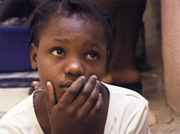
International Documentary Filmfestival Amsterdam 2001
Children Of The Shadows
© Karen Kramer
photos courtesy of IDFA 2001

| |
A painful film showing more of the malaise present in the world today.
Without education or any successfully applicable method of birth control,
families struggling with poverty in Haiti often find recourse to send one of
their children to live with another family. On rare occasions, this can turn
out to be a blessing for a child who becomes accepted as a member of the new
family, but, as more often is the case, they usually wind up becoming
"restaveks" (from the French "rester" and "avec"),
cheap slave labor for the household into which they have been brought.
Expected to do all the chores which might otherwise have been done by the
children of the house, whose energies are now preserved for study, the
"restaveks" also go to school, but at the end of an exhausting day
of labor. These new human household-replacements refer to their masters as
"aunt" or "grandmother", but the reality of sweeping,
cleaning, mopping, cooking, carrying wood and water, and burning charcoal show
what the true relationship is between them and their masters.
IDFA 2001
 |
Though rarely spoken of in the community, these children are also often abused
sexually and used as a sort of training tool by other children in the family
(who are in the process of discovering their own sexuality). Endless tasks and
a tiresome lifestyle keep them busy throughout the day and turn them rapidly
into unhappy, life-shorn adults housed inside the bodies of children. They
find themselves trapped in a vicious circle where lower classes are trained to
retain their position within the social structure while the actual children of
a household improve their potential in the world outside.
Director Karen Kramer gives a saddening portrait of how things go in a country
plagued by economic, sociological and political problems. According to UNICEF
there are 250,000 of these "restaveks" legally sanctioned by the
Haitian government which, in allowing this situation to exist, ignores
international laws regarding forced labor and the exploitation of children.
© 1994-2006 The Green Hartnett
|

